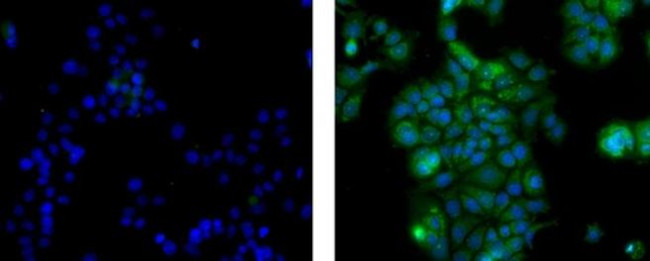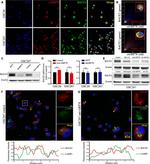Search Thermo Fisher Scientific
Invitrogen
GRP78 Monoclonal Antibody (C38), Alexa Fluor™ 488, eBioscience™
Product Details
53-9768-82
Species Reactivity
Published species
Host/Isotype
Recommended Isotype Control
Class
Type
Clone
Conjugate
Excitation/Emission Max
Form
Concentration
Purification
Storage buffer
Contains
Storage conditions
Shipping conditions
RRID
Product Specific Information
Description: The monoclonal antibody C38 recognizes human glucose-related protein 78 (GRP78). The GRP78 is encoded by the HSPA5 gene and functions as an endoplasmic reticulum (ER) chaperone protein and is a member of the heat shock protein 70 family. GRP78 functions within the ER lumen to facilitate proper protein folding, to prevent intermediates from aggregating, to target misfolded proteins for degradation, and as a calcium binding protein capable of recognizing ER stress and inducing the Unfolded Protein Response (UPR). During normal cellular function, GRP78 is bound to the transmembrane sensor proteins PERK, IRE1, and ATF6, keeping them in an inactive state. During ER stress, GRP78 binds to the hydrophobic residues of unfolded proteins within the ER and releases the sensor proteins, allowing signaling to the nucleus and the initiation of the UPR. During the UPR, protein synthesis is slowed and the transcription of ER chaperones is upregulated, increasing the capacity of the ER.
GRP78 is normally expressed at basal levels in all adult organs and is required for the proliferation and survival of embryonic stem cells. GRP78 expression is upregulated in cancer cells due to the increased numbers of underglycosylated and misfolded proteins responsible for triggering the UPR. In addition to being expressed in the ER, GRP78 is also expressed on the surface of cancer cells. Evidence also suggests that GRP78 plays a role in promoting tumor growth and metastasis by inhibiting apoptosis. GRP78 overexpression confers drug-resistance to chemotherapeutic agents and the level of expression can be correlated with pathologic grade and survival in breast, liver, prostate, colon and gastric cancers.
Applications Reported: This C38 antibody has been reported for use in immunohistochemical staining of formalin-fixed paraffin embedded tissue sections, microscopy, and immunocytochemistry.
Applications Tested: This C38 antibody has been tested by immunocytochemistry of methanol-fixed cells and can be used at less than or equal to 30 µg/mL. It is recommended that the antibody be carefully titrated for optimal performance in the assay of interest.
Excitation: 488 nm; Emission: 519 nm; Laser: Blue Laser.
Filtration: 0.2 µm post-manufacturing filtered.
Target Information
GRP78 is a 78 kDa glucose regulated protein that belongs to the family of heat shock proteins that include HSP70. GRP78 is a resident protein of the endoplasmic reticulum (ER) and associates transiently with a variety of newly synthesized secretory and membrane proteins. GRP78 may also interact with mutant and misfolded proteins, marking them for degradation. The highly conserved sequence Lys-Asp-Glu-Leu (KDEL) is present at the C-terminus of GRP78 and other resident ER proteins including glucose regulated protein 94 (GRP94) and protein disulfide isomerase (PDI). The KDEL signal is recognized by the KDEL receptor and this interaction ensures recycling of escaped ER proteins back to the ER. GRP78’s involvement in correct folding of proteins and degradation of misfolded proteins is via its interaction with DNAJC10, probably to facilitate the release of DNAJC10 from its substrate. GRP78 is critical for maintenance of cell homeostasis and the prevention of apoptosis. GRP78 protein levels have been shown to be a reliable biomarker of hypoglycemia and serves a neuroprotective function in neurons exposed to glutamate and oxidative stress. GRP78 levels are reduced in the brains of Alzheimer's Disease patients, and decreased expression of GRP78 is found associated with missense mutations in the human presenilin-1 (PS1) gene. Further, the induction of the GRP78 protein has been associated with the development of drug-resistance to antitumor drugs.
For Research Use Only. Not for use in diagnostic procedures. Not for resale without express authorization.
Bioinformatics
Protein Aliases: 78 kDa glucose-regulated protein; Binding-immunoglobulin protein; BiP; Endoplasmic reticulum chaperone BiP; endoplasmic reticulum lumenal Ca(2+)-binding protein grp78; epididymis secretory sperm binding protein Li 89n; FLJ26106; glucose-regulated protein, 78kDa; GRP-78; heat shock 70kDa protein 5 (glucose-regulated protein, 78kDa); Heat shock protein 70 family protein 5; Heat shock protein family A member 5; HSP70 family protein 5; HSPA 5; Immunoglobulin heavy chain-binding protein
Gene Aliases: BIP; GRP78; HEL-S-89n; HSPA5; MIF2
UniProt ID: (Human) P11021
Entrez Gene ID: (Human) 3309

Performance Guarantee
If an Invitrogen™ antibody doesn't perform as described on our website or datasheet,we'll replace the product at no cost to you, or provide you with a credit for a future purchase.*
Learn more
We're here to help
Get expert recommendations for common problems or connect directly with an on staff expert for technical assistance related to applications, equipment and general product use.
Contact tech support



